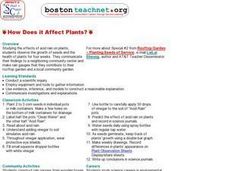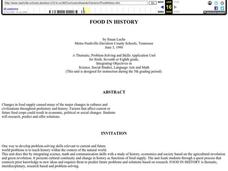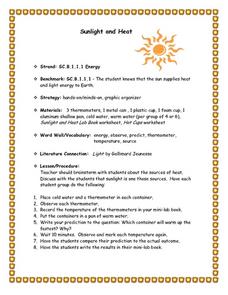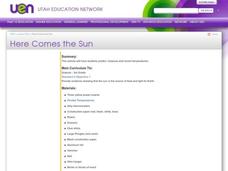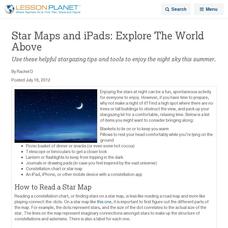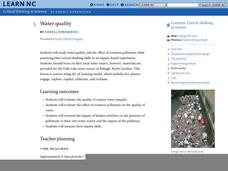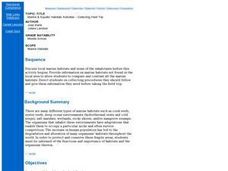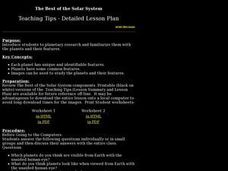Curated OER
A Journey to Language Arts
Young scholars explore events of the Lewis & Clark expedition. Students observe a PowerPoint presentation. They demonstrate journal writing using first person point of view. Young scholars describe life in North America during the...
Curated OER
Cyber Vacation
Students will look up information concerning their destination. The information should include their destination; the monetary system of the country; cost of hotels; airplane fares, etc. They look at ways to improve o searches as a...
Curated OER
Environment: Arctic Climate and Geoscience
Students conduct a thorough investigation of the Arctic and how climate change affects it. After listing a KWL chart, they record their findings on a bulletin board. Finally, in an Arctic Alive! interactive lesson, students take a...
Curated OER
Art: Mirror Of History
Students show through art how major human events have changed American Culture. Students write in a journal to keep track of studying that is done during the unit. They also create an oral report.
Curated OER
Organization 1: Look at What I Organized!
Students recognize that organizing things can make it easier to find things later.
Curated OER
How Does it Affect Plants?
Middle schoolers examine the effects of acid rain on plants. They observe the growth of seeds and the health of different plants for a month. They share their findings with the community.
Curated OER
Insect Unit
Fourth graders study the lives, and features of insects in the series of lessons that make up this unit.
Curated OER
Food in History
Students research, predict and offer solutions regarding factors that affect current or future food crops could result in economic, political or social changes.
Curated OER
Exploring With Photograms
Young scholars observe the interaction between energy absorbed, reflected or transmitted through an object in a photochemical process with a classroom demonstration.
Curated OER
Sunlight and Heat
Students brainstorm about the sources of heat. They discuss that sunlight is one of those sources. Students complete a lab about cold water and warm water. They record the temperatures from each thermometer and discuss which container...
Curated OER
The Plant Restoration Project
Students discuss Restoration Ecology. They see that restoration can mean removing invasive, non-native plants and replacing them with native plants grown by Students.
Curated OER
Here Comes the Sun
Third graders watch a video on the solar system and examine the role of the sun. As a class, they complete a KWL chart and make different color temperature pockets to use during their experiment. In groups, they make predictions about...
Curated OER
Star Maps and iPads: Explore The World Above
Use these helpful stargazing tips and tools to enjoy the night sky this summer.
Curated OER
Life on the Edge
Students participate in a variety of activities about endangered animals. They read books, watch videos, and, in pairs, choose an endangered animal to research. They create a 2 slide presentation to be compiled into a class slide show.
Curated OER
The Water Cycle
Fifth graders review and discuss, "The Water Cycle" and its key elements of evaporation, condensation and precipitation. They create a terrarium in groups to connect concepts of The Water Cycle and to view precipitation, condensation,...
Curated OER
Water Quality
In this unit of lessons, students examine the quality of water. They create poems and make observations about the quality of water. They also examine hot spots and the quality of water in the Great Lakes.
Curated OER
Collecting Field Trip
Students identify and describe each marine habitat. They name organisms that can be found in each habitat and discover ways in which to protect them. They participate in an activity to complete the lesson.
Curated OER
Unearthing The Facts
Students use agriculture related questions in order to build research skills. The questions are given and then they are expected to determine the best resource for finding the answers. The connection to the farmer is how they use...
Curated OER
Observing Fruits and Seeds
Third graders discuss what they think the word "observation" means and discover different ways that we observe. They observe as the teacher demonstrates how to use a hand lens as a tool for observing tiny details. They then use hand...
Curated OER
FIELD NOTE SCAVENGER HUNT
Learners explore how to take good field notes through a scavenger hunt.
Curated OER
Investigating Erosion in an Outdoor Classroom
First graders observe the effects of erosion. They work in groups to simulate erosion in a streambed, participate in class discussion, read books about fossils and rocks and then go on a fossil hunt.
Curated OER
Little Me in a Big World: Ants
Pupils use the life cycle of an ant to learn about their own self-esteem. In this self-esteem lesson plan, students read books about ants and discuss obstacles from the stories as well as the ant behavior.
Curated OER
Planetary Research (Grades 9-12)
Students are introduced to planetary research and familiarize them with the planets and their features. They see that each planet has unique features. Planets have some common features and that images can be used to study the planets and...








